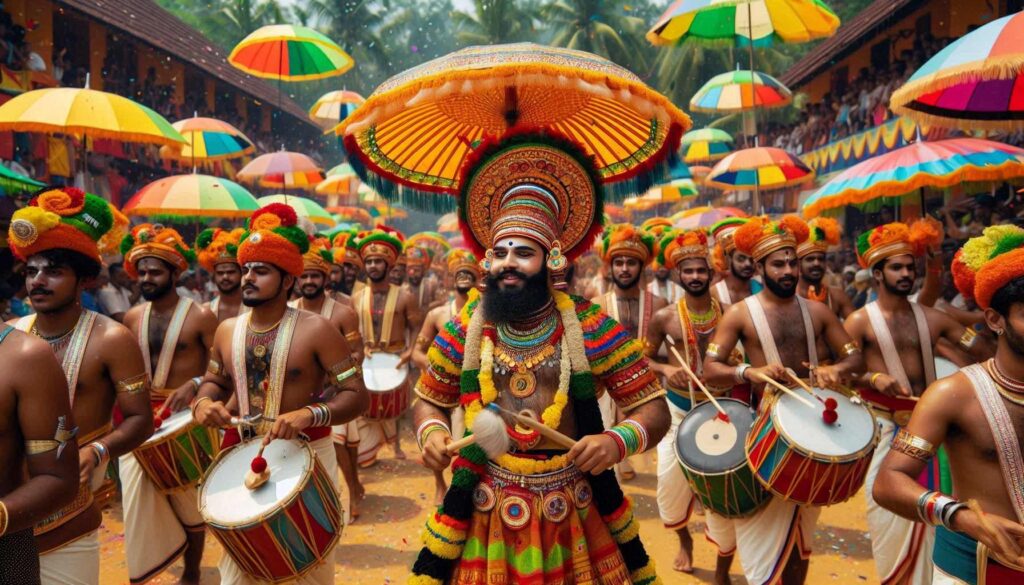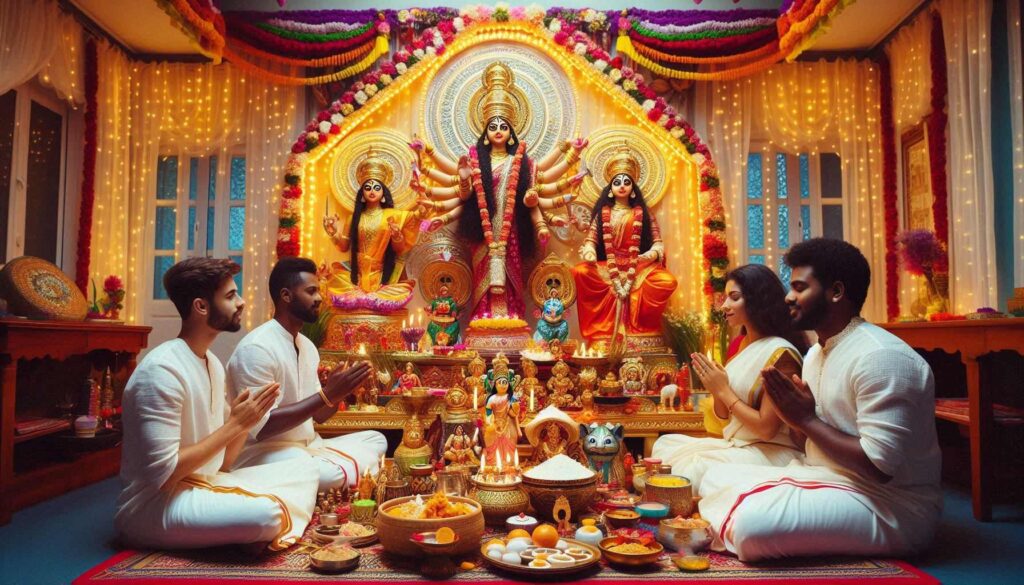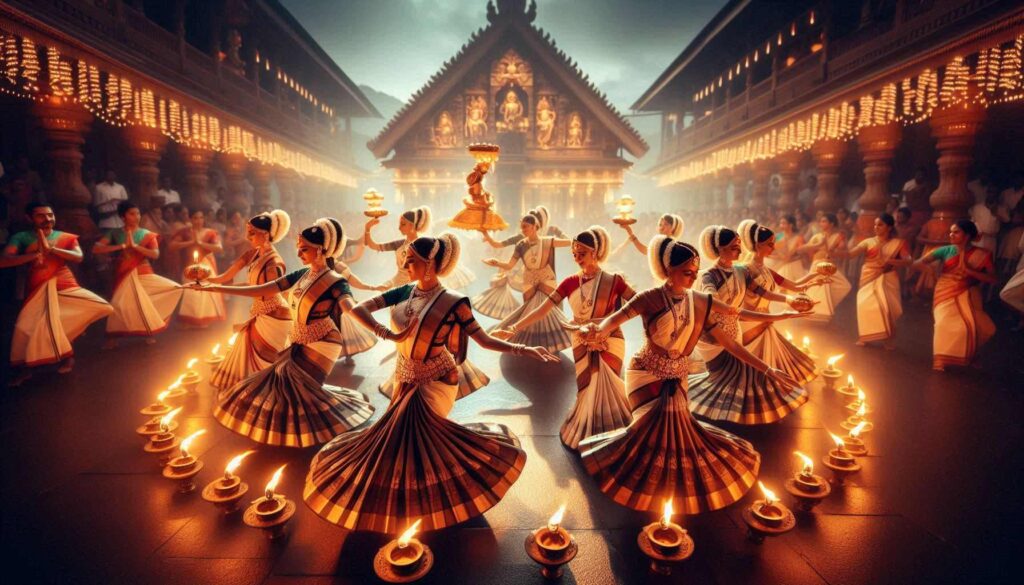Festivals in Kerala in October 2025
Kerala, the land of lush green landscapes, tranquil backwaters, and divine temples, is also known for its rich cultural traditions, particularly its festivals. The month of October marks the transition into the cooler months, and with it comes a wave of vibrant festivals that reflect the spiritual, cultural, and social fabric of this unique region. From Navaratri and Durga Puja to Thiruvathira and Vallappally Perunnal, October in Kerala is filled with joy, devotion, and a sense of community. This article explores the major festivals of Kerala in October 2025, providing insights into their significance, rituals, and celebrations.
Read More About Hindu Philosophy
1. Vallappally Perunnal (October 2025)

Vallappally Perunnal is one of the prominent festivals in Kerala, especially celebrated in the Vallappally Church located in the Changanassery region. This festival, which typically takes place in October, honors St. George, the patron saint of the church. Vallappally Perunnal is known for its elaborate processions, special masses, and vibrant community gatherings.
Rituals and Celebrations
- Holy Mass: The festival begins with a solemn Holy Mass where devotees gather in the church to offer prayers and seek blessings. Special masses are held on the day of the festival, followed by traditional Kerala hymns.
- Processions: The highlight of Vallappally Perunnal is the grand procession that is taken out with great devotion. A statue of St. George is paraded through the streets, accompanied by people chanting prayers and singing devotional songs.
- Feasts: The celebrations also include communal feasts where people from different backgrounds come together to share a meal, symbolizing unity and brotherhood.
This festival stands as a testimony to Kerala’s Christian heritage and is a wonderful example of interfaith harmony in the region.
2. Navaratri and Durga Puja (October 2025)

October is synonymous with the grand celebrations of Navaratri and Durga Puja, two of the most significant Hindu festivals celebrated with great fervor in Kerala. These festivals, dedicated to the worship of Goddess Durga, are celebrated with devotion, dance, music, and community gatherings.
Significance of Navaratri
- Navaratri, meaning “Nine Nights,” is a festival that spans nine days and nights, dedicated to honoring the divine feminine energy represented by Goddess Durga. In Kerala, Navaratri is often linked with Durga Puja, a tradition that involves special prayers, rituals, and celebrations in temples and homes.
- During these nine days, devotees perform fasting, prayers, and rituals to worship the various forms of Durga, including Maa Durga, Maa Lakshmi, and Maa Saraswati.
Rituals and Traditions
- Kolu: In many Kerala homes, women set up a traditional Kolu, a decorative display of idols, dolls, and images of gods and goddesses. Families gather each day to offer prayers and enjoy traditional sweets.
- Navaratri Puja: Temples across Kerala perform Navaratri Puja, where elaborate rituals are conducted in honor of the goddess. The final day, known as Vijayadashami, marks the triumph of good over evil and is a time of community prayer and celebration.
- Cultural Programs: In Kerala, it is also common to organize cultural programs like Garba, Dandiya, and traditional music performances during Navaratri. These cultural performances reflect the vibrant spirit of the festival.
Durga Puja Celebrations
- The Durga Puja in Kerala follows a similar theme, focusing on the worship of Goddess Durga, who symbolizes power and protection. In addition to traditional prayers and rituals, communities set up Pandals (temporary structures) to house the idols of Durga and her family. The community comes together for prayers, bhajans, and processions to celebrate the goddess’s victory over the demon Mahishasura.
- Thiruvananthapuram, Kochi, and Kottayam are key locations where large-scale Durga Puja celebrations are held, attracting thousands of devotees and tourists alike.
3. Thiruvathira (October 2025)

Thiruvathira is a unique festival celebrated primarily by the Nair and Namboothiri communities of Kerala. It is dedicated to the worship of Lord Shiva and is traditionally observed by women who perform special prayers and rituals for marital harmony and longevity. In 2025, Thiruvathira will fall in October, and it is expected to be marked by vibrant celebrations.
Rituals and Traditions
- Fasting and Prayer: Devotees, primarily women, observe a fast during the day, worshipping Lord Shiva, and performing rituals to honor him. The fast is broken only after the evening prayers, during which they seek blessings for the well-being of their husbands and families.
- Dance and Songs: A distinctive feature of Thiruvathira is the performance of Thiruvathira Kali, a traditional dance form performed by women. The dance is characterized by graceful movements and is accompanied by folk songs that narrate stories of Lord Shiva and Goddess Parvati.
- Puja and Offerings: In temples dedicated to Lord Shiva, special pujas are held, and offerings like coconut, rice, and flowers are made to seek divine blessings.
4. Kerala’s Traditional Cultural Programs in October
In addition to the above festivals, Kerala hosts several traditional cultural programs throughout the month of October. These include folk performances, classical dance forms, and local celebrations that reflect the region’s rich artistic heritage.
- Kathakali: One of Kerala’s most iconic dance-drama forms, Kathakali, is often performed during festivals. This classical art form, known for its elaborate makeup and costumes, narrates stories from the Mahabharata, Ramayana, and other epics.
- Mohiniyattam: A classical dance form dedicated to the worship of Lord Vishnu, Mohiniyattam is performed by women and tells stories through graceful movements. It is an integral part of the cultural celebrations during Navaratri and Durga Puja.
- Kalaripayattu: Kalaripayattu, the traditional martial art form of Kerala, is sometimes performed during festivals. Its vigorous movements and precision techniques showcase the strength and discipline inherent in Kerala’s cultural practices.


